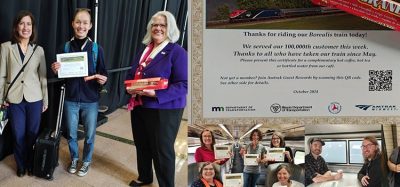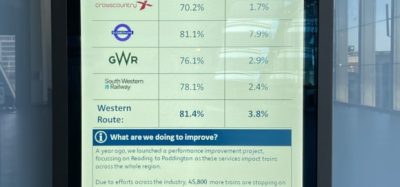UK Government supports projects to improve train journeys for disabled passengers
Posted: 27 June 2018 | Global Railway Review | No comments yet
A series of innovative, high-tech schemes, including an augmented reality project to support people who use sign language on train journeys, will be developed after winning a government-funded competition.


Credit: TfL
The app, Signly, will use the latest software to give people who are deaf or hard of hearing access to essential written travel and safety notices by delivering signed content directly to their smartphone or tablet.
Signly will be developed as part of the Department for Transport’s commitment to improving journeys for disabled rail passengers. It is one of seven projects which will receive funding to make their ideas a reality.
Other projects to receive start-up funding include Nodality – a website that is set to give disabled passengers and carers all the information they need to understand how accessible a station is.
Nusrat Ghani, Transport Accessibility Minister, said: “I am determined to make sure that our railways are accessible to everyone, and that we remove any barriers faced by people with a disability. Everyone deserves the right to travel independently and with confidence. I am delighted that these innovative projects have been picked to improve people’s journeys and look forward to seeing how they benefit passengers in the years to come.”
Alongside Signly and Nodality, the list of other projects to receive a share of £600,000 funding is:
- Accessibility Evaluation Survey for Stations (ACCESS): A tool to help those responsible for station accessibility to identify problems and prioritise improvements
- Less Visible Impairments (LVIS): A study to be carried out into increasing frontline staff’s understanding about the difficulties faced by passengers with hidden disabilities, such as dementia
- Rail4All: An app to help station staff prioritise requests from disabled passengers and notify the user that their request for support has been received
- Accessible Journey Pocket Assistant: A journey planner giving passengers bespoke guidance for every step of their trip
- Aubin: An app designed to improve rail journeys for people with autism by using stress-related preferences, rather than time or cost, to help the user reach their destination.
The innovation competition was run by RSSB, the Rail Safety and Standards Board, as part of the Department for Transport’s work to improve accessibility for all passengers, across all modes of transport. The government’s Inclusive Transport Strategy will be published later in 2018.
The aim of the competition was to find creative solutions to challenges faced by passengers with disabilities on the railways, and especially for those with less visible impairments.
Mark Applin, Co-Founder of Signly, said: “The Signly team are delighted the RSSB have seen the possibilities to improve passenger experience for deaf passengers who use British Sign Language. The grant funding affords the opportunity to meet deaf passengers and rail employees and develop simple tools that can make a difference day in, day out.”
Mark Phillips, Chief Executive of RSSB, said: “I am delighted that the Rail Accessibility Competition has inspired these exciting, innovative projects. These ideas will help achieve our aim of improving overall access to the railways for disabled people and contribute to a better, safer railway. We thank everybody who submitted proposals to the competition and look forward to supporting the winning projects.
Matt Garner from Ethos Farms (Nodality) said: “We are delighted to have won this prestigious competition and look forward to delivering an innovative and transformational product that will assist disabled customers in their end-to-end rail journey.”
Related topics
Passenger Experience/Satisfaction, Passenger Information Systems (PIS), Rail Fares/Ticket Pricing, Real-Time Passenger Information (RTPI), Smart/Contactless Ticketing, Technology & Software
Related organisations
Department for Transport (DfT), Nodailty, Rail Safety and Standards Board (RSSB), Signly








